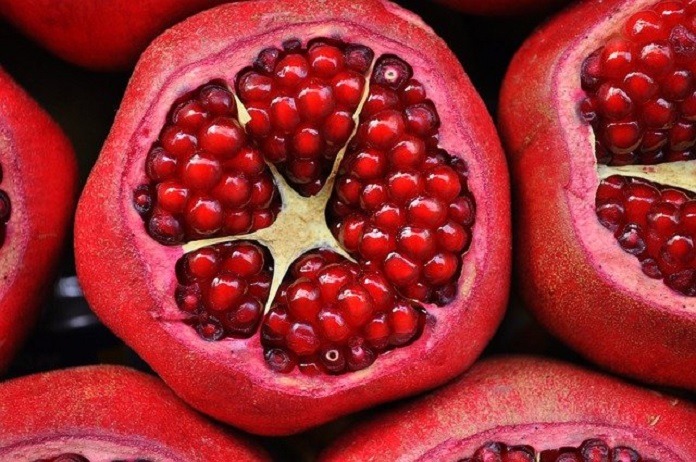Researchers in the United Kingdom investigated the effects of pomegranate juice on lowering blood sugar levels.
Pomegranates are rich in vitamins A, C, and E, as well as antioxidants. Pomegranates are also an excellent source of fiber and iron.
It’s no wonder then that research studies have investigated the effect of pomegranate juice, with positive results – such as lowering blood pressure and improvements in health biomarkers – but what about blood sugar?
Researchers set out to see whether pomegranate juice helps mediate the body’s response to sugar after consumption of a high glycemic index food.
What is the Glycemic Index?
The glycemic index (GI) is a scale used to indicate how a particular food affects blood sugar levels.
Foods are assigned a number that can be compared to pure glucose, which has the highest possible GI number of 100.
The GI values of all foods can be classified as either high GI (70-100), medium GI (50-70), or low GI (below 50).
The higher the GI value, the more quickly the carbohydrates are broken down in our bodies to be used or stored away.
Carbohydrates that are lower on the GI index, such as vegetables or whole-wheat products, are broken down more slowly and result in a more gradual rise in blood sugar levels, while higher GI foods like soda or sweets cause a drastic spike in blood sugar accompanied by increased insulin release.
Because of the positive effects of pomegranate juice reported in previous studies, researchers from the UK thought that pomegranate juice may actually modulate the body’s responses to high glycemic-index foods.
This may be due to pomegranate’s abundance of punicalagin and punicalin, which are the polyphenols that contribute to the unique taste of the juice.
Does pomegranate juice help lower blood sugar?
The researchers assessed the effects of pomegranate supplements, pomegranate juice, or a placebo solution that contained equivalent amounts of malic acid, citric acid, and potassium content of pomegranate juice.
A total of 48 healthy volunteers were recruited to test the effects of pomegranate juice on blood sugar levels after a meal consisting of 109 grams of white bread – a high glycemic index food.
- The volunteers were divided equally into three groups.
- For all participants, a starting blood glucose measurement was taken they ate the meal.
- A timer was started at the first bite or sip, and volunteers were given 15 minutes to eat the meal.
- Blood glucose measurements were taken again every 15 minutes for one hour, and every half an hour for an additional two hours.
- The measurements were taken with a glucometer, a machine that analyzes blood sugar content from a finger prick at each time point.
Pomegranate juice or supplements? – Research results
The results showed that the consumption of 200 mL of pomegranate juice reduced the glycemic response of bread, resulting in slower breakdown and a decreased peak blood sugar level.
Further testing showed that punicalagin, a pomegranate polyphenol, was an inhibitor of human α-amylase in vitro.
Since α-amylase is an enzyme that breaks down carbohydrates, its inhibition by the punicalagin in pomegranate juice explains the observed blood sugar response to high glycemic index white bread.
What’s more interesting is that only the pomegranate juice could produce these beneficial results – the pomegranate supplements did not appear to have the same effect.
The researchers speculate that this may have been due to the punicalagin in the supplement not mixing as well as the pure pomegranate juice in the stomach and small intestine in its encapsulated form.
This study showcases the potential of pomegranate polyphenols to advance our understanding of glucose metabolism in order to develop medications and strategies to help those with diabetes or obesity.
Needless to say, the benefits of pomegranate juice on blood sugar – and perhaps other benefits – merit further investigation.
Sources:
Kerimi, A., Nyambe-Silavwe, H., Gauer, J. S., Tomás-Barberán, F. A., & Williamson, G. (2017). Pomegranate juice, but not an extract, confers a lower glycemic response on a high–glycemic index food: randomized, crossover, controlled trials in healthy subjects. The American Journal of Clinical Nutrition, ajcn161968.
Babcock, J. (2017, June 20). Low Glycemic Diet: Benefits, Foods & Sample Plan. Retrieved October 26, 2017, from https://draxe.com/low-glycemic-diet
Image by megspl from Pixabay



